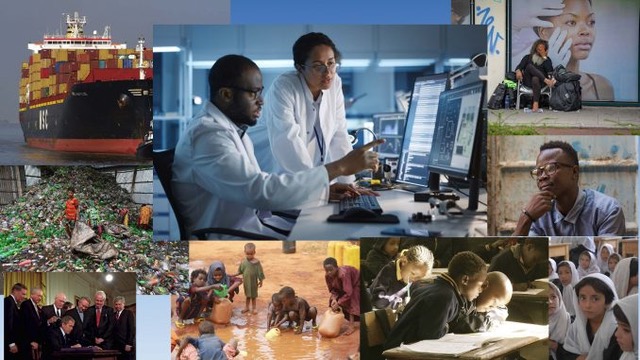====================================================================== CFP: Artificial Intelligence in Medicine (AIM@EPIA-2022) Thematic track of the 21st Portuguese Conference on Artificial Intelligence (EPIA 2022) August 31-September 2, 2022, Lisbon, Portugal. Webpage: epia2022.inesc-id.pt/ ======================================================================
IMPORTANT DATES Paper submission: April 15, 2022 Notification of paper acceptance: May 31, 2022 Camera-ready papers deadline: June 15, 2022 Conference dates: August 31-September 2, 2022
IMPORTANT NEWS – LNCS/LNAI Proceedings (springer) – Special issue at the Journal of Medical Systems with selected papers*
INTRODUCTION Everyday medicine is facing new challenges: new diseases, cost reductions, new therapeutics, rapid and accurate decisions, new techniques and technologies. Artificial Intelligence (AI) is playing an important role in the decision making process, in the way the data of the patients are collected, treated, processed, anticipating and avoiding critical situations, as well to test and simulate new treatments and devices. The big question to be answered is: How Artificial Intelligence can help to overcome these challenges and improve the efficiency of medicine? Data Science, Sensing, Pervasiveness, Ubiquity and Intelligent Agents in Medicine, can contribute with new artifacts and new knowledge for health professionals. AI aims to improve the usability of programs for assisting physicians in figuring out what is wrong with the patients and provide new solutions to help making better decisions. AI systems are intended to support healthcare practitioners in the normal course of their duties, assisting with tasks that rely on the manipulation of data and knowledge. In particular, these systems have for example the capacity to learn, leading to the discovery of new phenomena and the creation of medical knowledge improving human health and longevity. This track promotes a forum to discuss and present emergent topics, new projects and ideas about how AI can contribute to the field of Medicine and, improve patient conditions. By bringing together researchers from two distinct areas is expected to produce new scientific and technical knowledge in a particular area as is medicine. Special attention will be given to the social impact/gain of the AI contributions in medicine.
TOPICS OF INTEREST Innovative and exciting works are welcome in areas including but not limited to:
Medical methodologies, architectures, environments and systems. • Agents for information retrieval; • AI in Medical Education and Clinical Management; • Wellbeing and lifestyle support; • Interoperability, Security, Pervasiveness, Ubiquity and Cloud Computing in Medicine; • Methodological, philosophical, ethical, and social issues of AI in Medicine; • Pervasive Healthcare Environments; • Software architectures. Knowledge Engineering and Decision Support Systems: • AI-based clinical decision making and Clinical Decision Support Systems; • Automated reasoning, Case-Based Reasoning or Reasoning with medical knowledge; • Business Intelligence in Health Care; • Clinical Data Mining; • Data Streaming; • Diagnostic assistance; • Expert, agent-based or knowledge-based systems; • Medical knowledge engineering; • Intelligent Decision Support Systems in Medicine. Medical Applications and Devices • Computational intelligence in bio- and clinical medicine; • Electronic Health Records (eHealth); • Image recognition and interpretation; • Intelligent devices and instruments; • Sensor-based applications; • Telemedicine and mHealth solutions; • mIOT; • Ubiquitous devices in the storage, update, and transmission of patient data; • Usability and acceptability. AI in Healthcare Information Systems • COVID-19 data solutions; • Public Health Intelligent Systems • Autonomous systems to support independent living; • Healthcare System Based on Cloud Computing; • Intelligent Healthcare information systems; • Pervasive Information Systems; • Pervasiveness and Security in Clinical Systems; • Smart homes, hospitals and Intelligent Systems; • Simulation Computer systems.
PAPER SUBMISSION All papers should be submitted in PDF format through the EPIA’2022 submission Website. Submissions must be original and can be of two types: regular (full-length) papers should not exceed twelve (12) pages in length, whereas short papers should not exceed six (6) pages. Each submission will be peer-reviewed by at least three members of the Program Committee. The reviewing process is double-blind. The best-accepted papers will appear in the proceedings published by Springer in the LNAI series (previous EPIA proceedings were indexed by the Thomson ISI Web of Knowledge, Scopus, DBLP and ACM digital library). The remaining accepted papers will be published in the local proceedings with ISBN.
*Authors of the best papers presented at the AIM track of EPIA will be invited to submit extended versions of their manuscripts for a Special Issue in Journal of Medical Systems (Springer) or in Journal of AI in Medicine (Elsevier)
ORGANIZING COMMITTEE * Manuel Filipe Santos, University of Minho, PT (contact person) mfs@dsi.uminho.pt * Carlos Filipe Portela, University of Minho, PT cfp@dsi.uminho.pt * Allan Tucker, Brunel University London, UK, allan.tucker@brunel.ac.uk * Manuel Fernandez Delgado, SP, manuel.fernandez.delgado@usc.es
— Esta mensagem foi enviada para a rede APPIA, que engloba os associados da APPIA. Se desejar deixar de receber este tipo de mensagens, p.f. envie um email para appia [at] appia [ponto] pt




